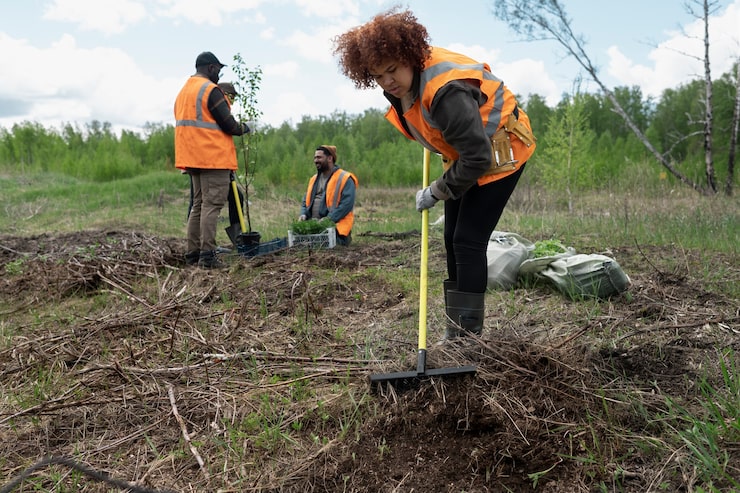How Excavation Contractors Help Prevent Water Damage on Your Dahlonega Property

Top 5 Materials for Culvert Pipes in Dahlonega: Pros & Cons
August 27, 2025Top Signs Your Driveway Needs a New Culvert Pipe System
September 17, 2025Water damage prevention starts with proper site preparation and drainage planning. Excavation contractors in Dahlonega GA play an important role in protecting properties from water-related issues that can cause thousands of dollars in damage and create ongoing maintenance headaches.
The mountainous terrain and heavy rainfall patterns in North Georgia create specific challenges that require professional expertise to address effectively. Understanding how excavation work contributes to water damage prevention helps property owners make informed decisions about protecting their investments.
Site Grading & Surface Water Management
Proper site grading forms the foundation of effective water management. Professional excavation contractors analyze natural drainage patterns and modify terrain to direct water away from structures and sensitive areas. This process involves creating calculated slopes that promote controlled water flow while preventing erosion.
Surface water management begins with understanding how water moves across your property during different weather conditions. Contractors evaluate existing drainage patterns and identify areas where water tends to pool or flow toward buildings. Strategic grading modifications redirect this water to appropriate drainage outlets.
The grading process also involves creating swales and berms that channel water along predetermined paths. These features work together to manage both routine rainfall and storm events, preventing water from accumulating near foundations or other critical areas.
Excavation contractors use specialized equipment to achieve precise grading specifications. Laser leveling technology ensures accurate slopes that promote proper drainage while maintaining aesthetic appeal. The finished grading integrates seamlessly with landscaping plans and architectural features.
French Drain Installation & Subsurface Drainage
Subsurface drainage systems address water issues that surface grading cannot resolve alone. French drains intercept groundwater before it reaches foundations or basements, providing crucial protection against hydrostatic pressure and moisture infiltration.
Professional installation involves excavating trenches at specific depths and grades to ensure proper water collection and transport. The trench preparation must account for soil conditions, groundwater levels, and the intended drainage outlet location.
Proper French drain construction requires careful attention to filter fabric placement, gravel selection, and pipe installation. Each component serves a specific function in the overall drainage system, and improper installation can lead to system failure and renewed water problems.
Excavation contractors coordinate French drain installation with other site improvements, ensuring compatibility with landscaping, utilities, and future construction plans. This integration approach prevents conflicts and maximizes system effectiveness.
Foundation Protection Through Strategic Excavation
Foundation water damage often results from inadequate drainage around building perimeters. Excavation contractors create protective systems that keep water away from foundation walls and prevent moisture-related structural issues.
Excavation work around foundations involves careful soil removal and replacement with materials that promote drainage. This process may include installing drainage aggregate, waterproof membranes, and protective barriers that shield foundation walls from moisture contact.
The excavation process also addresses grading issues that direct water toward foundations. Contractors modify slopes to create positive drainage away from buildings while maintaining proper soil support for foundation stability.
Professional foundation excavation work often reveals existing drainage problems that property owners were unaware of. Early identification and correction of these issues prevent costly repairs and protect long-term structural integrity.
Utility Line Protection & Water Service Improvements
Excavation contractors frequently discover and address utility line issues that contribute to water problems. Damaged or improperly installed utility lines can create moisture problems and compromise overall site drainage.
Water service line improvements often require excavation work to access existing pipes and install upgrades. Professional contractors coordinate this work with water management improvements, creating comprehensive solutions that address multiple issues simultaneously.
Sewer line problems can also contribute to water damage issues. Excavation work for sewer line repair or replacement provides opportunities to implement additional drainage improvements that protect the property from future water problems.
The excavation process allows contractors to properly backfill utility trenches with materials that support overall drainage objectives. This attention to detail prevents future settling or drainage issues related to utility installations.
Erosion Control & Long-Term Stability
Erosion control measures implemented during excavation work provide ongoing protection against water damage. Professional contractors install systems that prevent soil loss while maintaining effective drainage patterns.
Retaining walls and terracing systems created through excavation work help manage steep slopes that might otherwise contribute to erosion problems. These structures provide permanent solutions that protect both the immediate property and downstream areas.
Excavation contractors also implement temporary erosion control measures during construction to prevent soil loss and sedimentation issues. These protective measures demonstrate professional commitment to environmental responsibility and long-term site stability.
The excavation process allows for soil amendments and improvements that support long-term stability. Contractors can identify and address soil conditions that might contribute to future water management problems.
Storm Water Management Systems
Large-scale storm water management requires sophisticated excavation work to create detention ponds, infiltration systems, and conveyance channels. These systems protect properties from flood damage during heavy rainfall events.
Professional excavation contractors design and construct storm water facilities that meet regulatory requirements while providing effective flood protection. The construction process involves precise earthwork to achieve proper storage volumes and outlet configurations.
Storm water system construction also includes access roads, maintenance facilities, and safety features that ensure long-term system performance. Excavation contractors coordinate these elements to create functional, maintainable facilities.
Professional Assessment & Custom Solutions
Experienced excavation contractors in Dahlonega GA provide comprehensive site assessments that identify water management needs and recommend appropriate solutions. This professional evaluation process considers factors such as soil conditions, topography, climate patterns, and regulatory requirements.
Custom excavation solutions address specific site challenges that standard approaches cannot resolve effectively. Professional contractors develop innovative approaches that work within site constraints while providing maximum water damage protection.
The assessment process also identifies opportunities to combine water management improvements with other site development objectives, creating cost-effective solutions that provide multiple benefits.



